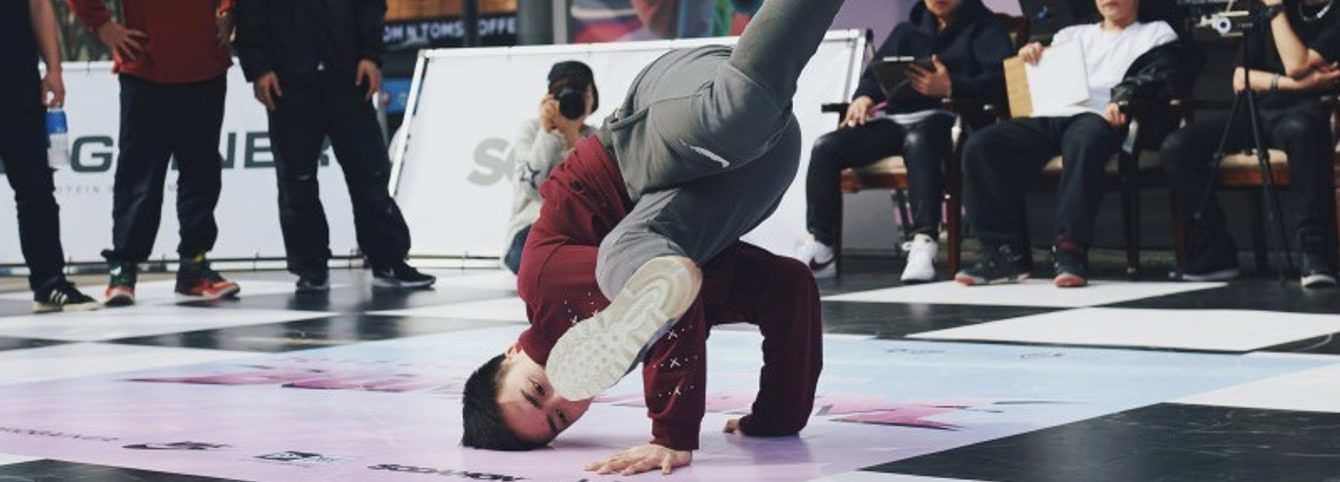Meet hip-hop diplomat Victor Yau! Victor is an alumnus of the 2015 CLS Korean Program in Gwangju, South Korea and the 2021 CLS Refresh Program. For Victor, what began as a fascination with Korean breaking — the proper term for ‘breakdancing’ — has evolved into a public diplomacy career as a U.S. Department of State Foreign Service Officer.
CLS launched Victor’s trajectory into public service and international relations. He returned to South Korea for a full year of language study via the Boren Scholarship. He completed a two-year Master in Public Affairs at Princeton with the support of the Rangel Fellowship. This past June, he swore into the U.S. Department of State as a Public Diplomacy Officer.
Throughout childhood, Victor had less than positive feelings toward foreign languages. He resented hearing his parents’ long Cantonese lectures, attending Mandarin Chinese school on weekends, and struggled to maintain participation grades in Spanish class.
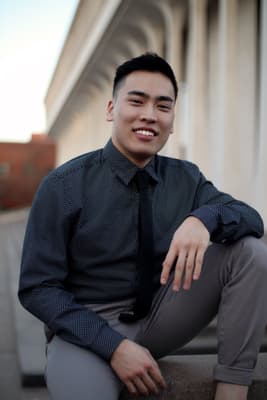
CLS flipped that on its head.
Victor now describes himself as a polyglot and life-long language learner — watching news and journaling in multiple foreign languages daily. Today, he speaks seven languages. He will use his newest one — Khmer — in his upcoming assignment to Mission Cambodia, the first of many overseas tours in his diplomatic journey.
Victor recently sat down with Communications Officer Rori DiFiore to discuss breaking, language learning, public diplomacy, and how a single decision can change your entire life.
Rori DiFiore: Where did your interest in learning Korean begin?
Victor Yau: It started with my background as a hip-hop dancer. Since high school, I did competitive breaking (i.e. breakdancing). I watched international breaking battles on YouTube every day and noticed that the Korean dancers always dominated the international competition and came out on top. I thought to myself, what if one day I could go to Korea and learn from these dancers? That was a fantasy I harbored throughout high school. My freshman year of college, I got an email about a scholarship I had never heard of called CLS. It mentioned it would send you on an eight-week fully funded program to a bunch of different countries including Korea. I thought, wow, I could spend a summer in Korea and potentially meet the dancers that I idolized since I was 16! I ended up taking the chance and applying for CLS Korean and luckily, it worked out.
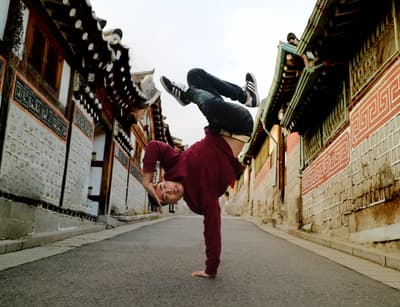
RD: What do you think you did in your application that helped you stand out?
VY: I argued that I wanted to use Korean language to launch an international chain of hip-hop dance studios and connect people through the universal language of art and dance. Hip-hop art and breaking transcends barriers. Not everyone has the privilege of going abroad and learning languages, but art and dance are accessible to anyone with the desire to learn. When I applied for Boren the following year, I advocated for advancing international security by integrating at-risk refugee youths using hip-hop art programs. A National Security Education Program essay reader remarked that my application stood out.
RD: How did CLS impact your career aspirations?
VY: CLS was the first time I got a chance to go outside of North America. I got to travel to East Asia, learn a language and build community with students not only from across the U.S., but around the world. It was the happiest ten weeks of my life up to that point. I realized that I wanted to travel the world and learn languages for the long-term, but didn’t know how to make that happen. After returning from CLS, I attended a career session with the University of Houston’s Diplomat in Residence, John Roberts. He told me about his Foreign Service career, how he got paid to learn languages and travel abroad, and his thrilling experiences representing the U.S. worldwide. Listening to everything he said, I got chills in my chest. I thought this is what I want, this is what’s next for me.
RD: Has language learning always been a passion of yours?
VY: For the first sixteen years of my life, I hated language learning with a passion. I grew up in a Chinese American family. My parents would speak Cantonese to me, and I would always reply in English. At Chinese school, I didn’t really try because I resented having to go to school on weekends. But while studying Korean during CLS, I realized the power of language to connect with people from radically different backgrounds and upbringings. I wanted to continue language learning in the U.S., but my university didn’t offer Korean classes, so I enrolled in Mandarin. I did Korean tutoring on the side and looked for opportunities to continue with Korean which led me to the Boren Program. CLS opened the door for me to enjoy learning languages and do it with confidence.
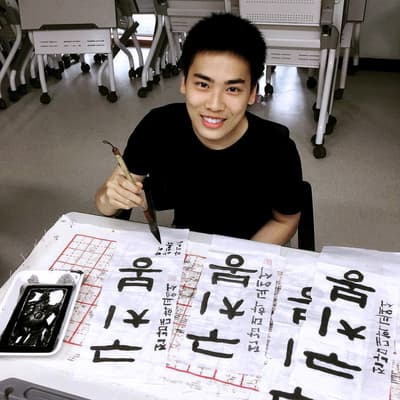
RD: How is your CLS Refresh experience going?
VY: CLS Refresh allowed me to learn Korean at a much higher level. On my first day of Refresh, I told my instructor that my goal was to get a 4/4 on the Korean proficiency test at the Foreign Service Institute. We focus on topics I will need to know while serving as a Foreign Service Officer in Korean-speaking communities. My instructor and I work together via a collaborative, current event-heavy class structure.
RD: In what ways will speaking multiple critical languages benefit you in your career?
VY: Each of these languages opened a new door that I didn’t think I could open. When I go abroad, I think the people I encounter will appreciate that an American took the time to learn their language at a high-level. Whenever I speak to someone in their native language, it shows that I put in time and effort to learn something that is so integral to their identity and their background. You can just see it on someone’s face, they light up. I can see them let their guard down, they trust me. It’s an opportunity for another friendship and opens the doors to yet another fulfilling experience.
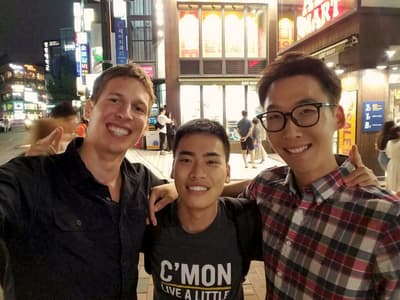
RD: What advice would you give to students applying for CLS?
VY: It’s important to have fun with it. Learning a language is a long journey and it's not something you can ever really master. There is always something you could improve on or another avenue to explore. Because it's never-ending, it's important to figure out how to have fun with it and your “why.” Once you do that, everything else falls together. Also, articulating your goals and personal narrative through the application process is beneficial no matter the result. I like to tell applicants I mentor, “Think of yourself as a superhero in a Marvel movie, this is you writing your origin story.” Constructing and communicating your own narrative is a powerful exercise. Whether you receive the scholarship or not, use the application process as an opportunity to strengthen your sense of direction and identity.
RD: What would you say to students who don’t think CLS is for them or intimidated?
VY: To anyone feeling discouraged or defeated, I want you to know that I barely got it. When I applied for CLS 2015 the first time, I was waitlisted for five months. In June, I received a phone call from an unknown DC number, which turned out to be American Councils. They said, “Hey you just got promoted to a finalist, congratulations! Can you be in DC in six days?” A finalist had dropped out six days before orientation. That entire day I thought, throw away my summer plans and be in DC in six days? I don’t know if I can do this. But after consulting with a bunch of professors and trusted mentors, I realized that this was a once in a lifetime opportunity that I couldn’t let slip. I lost a lot of sleep in those six days — dropping the summer courses I was two weeks into, moving out of my dorm, finding storage for my stuff, doing physicals, completing the mountain of CLS paperwork — but I made it to DC in time for orientation. Even after CLS Korean 2015, I reapplied two or three times and was rejected before the semi-finalist round. If anything I have said up to this point is at all impressive, know that even I was barely accepted and was rejected multiple times. If someone like me can do it, maybe you can too.
RD: Wow thank you for sharing that! It’s so important to go after these experiences and, like you mentioned before, be the main character of your life.
VY: Funny story. A couple weeks ago, I was at a CLS Alumni Society happy hour in DC. Two of the first people I met at the bar happened to be 2014 Korean alumni. One of them told me, “I got CLS 2015 but ended up not doing it because of an internship.” I turned back to him and said, “That's interesting, because when I did CLS 2015, I got off the waitlist when someone dropped out last minute for an internship!” Turns out this was the same guy who I replaced as a finalist six years ago. I half-jokingly thanked him for dropping out and opening the door for me to ultimately become a Foreign Service Officer.
RD: Wow what a full-circle moment!
VY: Yeah… but I did tell him he could’ve decided to take that internship just a couple days earlier.


